Doug Cook's Blog, page 33
March 5, 2012
Retaining Black Belts
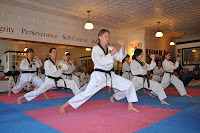 By Master Doug Cook
By Master Doug CookI am on a mission, responding to a request from Grandmaster Richard Chun, my teacher and mentor, directing me to author a column focusing on the retention of black belt holders within my school. Without being presumptuous, this editorial contribution will likely appeal to school owners in particular. Often, on special occasions when in attendance, Grandmaster Chun has expressed surprise and delight at the number of advanced belts actively training at our institute. He routinely congratulates us on our ability to retain black belt students for many years of all degrees and ages.
Let me first say that the Chosun Taekwondo Academy is not what would be considered by today's standards, a large school. Yet, we presently host classes for as many as one hundred black belts from 1st to 4th dan, with 70% being adults. Many have been with us for well over a decade. Traveling as I do to various dojangs, I have come to realize that ours is a unique situation. So, how do we do it? That is what Grandmaster Chun asked that I share with the readers of Totally TaeKwonDo online magazine.
When one visits the standard business model currently employed by many schools, retention revolves around annual membership contracts administered, in most cases, by third-party providers. These financially obligatory documents require that the student commit to training anywhere from one to three, and in some cases even more, years. Once signed, the student is compelled to meet the terms of the contract based on pain of a negative credit rating; should a student decide to terminate their training, for whatever reason, and the agreed upon tuition is either not directly deducted from a checking account or charged to a credit card in recurring payments, the matter is quickly transferred to a collection agency.
Clearly, modern society responds well to money as a prime motivator for action. Consequently, the above policy serves a number of purposes. First - in the words of a venerable grandmaster who I've spoken with regarding this matter - not executing contracts "helps students quit." His comment is founded on the premise that if one is forced to make payments whether they participate in the program or not, they will ultimately choose to attend class albeit half-heartedly. Secondly, based on the system of automatic funds transfers, the school owner is assured of a secure, predetermined income. And lastly, since contacts are generally administered by outside billing companies, the school is relatively free of clerical responsibility, at least where tuition payments are concerned.
All of this appears to make good business sense…at least on the surface. Yet, I would argue that many martial artists, particularly adults and parents, consider the implementation of membership contracts onerous at best. Before consciously deciding not to exploit this financial tool years ago, I asked myself: Would a doctor, lawyer, barber or, for that matter, any professional of that type, require their client to sign a long-term contract securing their patronage before rendering services? And how would I as a consumer respond to that cunning sales tactic if they did?
I consider my skills just as beneficial to society as any of those offered by the aforementioned specialists. Why then have I deviated from what appears to be a primary financial tool of the martial arts industry in regards to securing membership, active or not? Answer: Because we have chosen a different path; one grounded in tradition, trust and honor bolstered by an unyieldingly comprehensive and challenging curriculum, ascending through high ranking black belt.
Permit me to point out that I am a devout tae kwon doist. I do not tolerate outside influences that will corrupt our pure-form curriculum. Nor do I support the current trend towards mixed martial arts. When I can truthfully say that I have "mastered" every aspect of traditional tae kwon do, then, and only then, would cross-training become an option. This is not to say that I do not investigate, academically, complimentary martial disciplines and how they relate to tae kwon do. Moreover, I sincerely feel that tae kwon do, if practiced in a traditional sense, contains most everything needed for effective self-defense and spiritual enrichment. This philosophy is reflected in our curriculum and in the culture of our school. Our students, particularly the many adult black belts enrolled, share this vision. Rather than feeling compelled to attend class largely urged on by financial commitment, they enthusiastically attend rooted in a desire to dive into the deep end of tae kwon do, taking advantage of our unlimited classes when convenient, grasping the philosophical principles of the art, and engaging in a complete martial arts program unsullied by flavor-of-the-day influences.
While I understand the necessity for many schools to rely on contractual tools to secure membership, I feel the richness of our curriculum alone is reward enough for the black belt to remain and train vigorously on a consistent basis. Accordingly, our syllabus, like many, is composed of a repeating template of requirements that increase in complexity throughout the various belt and dan levels and is predicated on proficiency in an escalating series of basics, one, two and three-step sparring, self-defense, poomsae, sparring and breaking skills. Likewise, just as color belts are encouraged to test every three months, so too are black belts who earn stripes in recognition of techniques and poomsae learned within the same timeframe; this, in addition to earning dan promotion consistent with Kukkiwon tenure and regulations. Striping of black belts between dan ranks is a crucial and unique aspect of the Chosun offering that has proven eminently effective in maintaining interest and precision of technique. But, here again, a meaningful, authentic curriculum must be in place geared towards the advanced student. Chosun members are also expected to familiarize themselves with Korean terminology and the philosophy associated with their required poomsae, hyung or tul. There is nothing haphazard about our program; every student knows exactly what is expected of them with the path to advancement clearly provided. Requirements are written out to avoid confusion and preserved as password-protected downloads on our web site to be included in a training journal each student is required to maintain throughout their membership.
Furthermore, my instructors and I highlight the self-defense, physical fitness, and self-enrichment components of the art; this is in keeping with tae kwon do as a martial way or a path to enlightenment. In addition, we amplify our practice with meditation and ki (internal energy) development exercises. As an added attraction for the mature black belt, while our school attends several tournaments a year, we do not view the classical martial arts simply as sport and, subsequently, do not focus merely on competition. Instead, we offer technical seminars and defensive courses to students, associated dojangs and civic groups at little or no charge as a community service.
And then there is the intriguing and effective assortment of poomsae or formal exercises we have at our disposal as a central pillar of our practice. As a United States Taekwondo Association affiliate school, we perform the eight Taegeuk and Palgwe set at color belt, supported by the traditional Moo Duk Kwan and required Kukkiwon Yudanja exclusive to black belts. We also practice the Kibon, Pyung-Ahn and Kuk Mu hyung in conjunction with several ITF tuls, although these are not required for promotion.
Retaining black belts, particularly adults, for the long term, without the anchor of burdensome membership contracts as a fundamental retention tool weighing them down, is a balancing act between commitment, motivation and commercial solvency. Yet, if the black belt is presented with an authentic, comprehensive and traditional tae kwon do curriculum free of confusing foreign influences, the task of retention becomes a rewarding challenge that results in a self-imposed desire to make tae kwon do an intrinsic and enduring part of life.
Published on March 05, 2012 16:37
TaeKwonDo Times Magazine Traditions Column by Master Doug Cook March, 2012
Devaluing the Black Belt
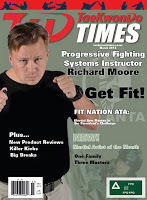
Very often I receive inquiries from parents seeking membership for their children who have trained elsewhere in the martial arts. Many come wearing black belts naturally leading me to believe that they have achieved a certain level of proficiency. Some have. Many, however, have not. Moreover, this confounding dilemma is not confined to youngsters. Teens and adults alike frequently request advanced recognition but are sadly and fundamentally lacking in technique. These and other related circumstances yield questions difficult to resolve: should youngsters be awarded the black belt in the first place? If not, then what age is appropriate? Furthermore, are the criteria for promotion to black belt equivalent from one tae kwon do dojang to the next? Are some curricula unfairly demanding? Is the black belt transferable from one martial art to another? And lastly, does the black belt hold the same meaning today as it did in the past?
Let me start out by saying that I am as guilty as any master instructor in giving my students the benefit of the doubt, technically, when testing for black belt. I allow for a certain margin of error in performance which rarely becomes an issue given the mandatory six-month waiting period between bodan or candidate, and 1st dan. Yet, preparation for this supreme accomplishment does not begin at bodan. Strict attention is relentlessly paid to basic technique from white belt on, resulting in a stunningly accurate performance when the moment for the black belt examination arrives. Consequently, whether the practitioner is ten years old or sixty, at a dojang such as ours that demands precision and unquestionable skill, the black belt is earned and not simply given. Read the entire column


Very often I receive inquiries from parents seeking membership for their children who have trained elsewhere in the martial arts. Many come wearing black belts naturally leading me to believe that they have achieved a certain level of proficiency. Some have. Many, however, have not. Moreover, this confounding dilemma is not confined to youngsters. Teens and adults alike frequently request advanced recognition but are sadly and fundamentally lacking in technique. These and other related circumstances yield questions difficult to resolve: should youngsters be awarded the black belt in the first place? If not, then what age is appropriate? Furthermore, are the criteria for promotion to black belt equivalent from one tae kwon do dojang to the next? Are some curricula unfairly demanding? Is the black belt transferable from one martial art to another? And lastly, does the black belt hold the same meaning today as it did in the past?
Let me start out by saying that I am as guilty as any master instructor in giving my students the benefit of the doubt, technically, when testing for black belt. I allow for a certain margin of error in performance which rarely becomes an issue given the mandatory six-month waiting period between bodan or candidate, and 1st dan. Yet, preparation for this supreme accomplishment does not begin at bodan. Strict attention is relentlessly paid to basic technique from white belt on, resulting in a stunningly accurate performance when the moment for the black belt examination arrives. Consequently, whether the practitioner is ten years old or sixty, at a dojang such as ours that demands precision and unquestionable skill, the black belt is earned and not simply given. Read the entire column
Published on March 05, 2012 12:50
March 2, 2012
Chosun e-newsletter archive volumn 3 #3 March, 2012
Chosun Taekwondo Academy Celebrating 15 Years!
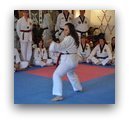 Chosun Student Essay
Chosun Student Essay
March is Women's History Month
Women's Education
Women's Empowerment
Olga Pico
First Dan Black Belt
As a young girl, I was taught that there were certain things young ladies should not do; among them, martial arts. Although, I was unable to train as a child, I was able to realize my dream through my daughter. As a mother, I believe it is my responsibility to teach my daughters that they can, and should, do anything that is within their ability to reach their potential. I do my utmost to teach them by example and hope that I inspire them to live their dreams. I am heartened to watch the women in our school excell and hope that I too, can be an inspiration for others; not only by my technique, but with the reverence that I approach Taekwondo.
Read entire newsletter
sign up for FREE monthly newsletter at http://www.chosuntkd.com/
 Chosun Student Essay
Chosun Student EssayMarch is Women's History Month
Women's Education
Women's Empowerment
Olga Pico
First Dan Black Belt
As a young girl, I was taught that there were certain things young ladies should not do; among them, martial arts. Although, I was unable to train as a child, I was able to realize my dream through my daughter. As a mother, I believe it is my responsibility to teach my daughters that they can, and should, do anything that is within their ability to reach their potential. I do my utmost to teach them by example and hope that I inspire them to live their dreams. I am heartened to watch the women in our school excell and hope that I too, can be an inspiration for others; not only by my technique, but with the reverence that I approach Taekwondo.
Read entire newsletter
sign up for FREE monthly newsletter at http://www.chosuntkd.com/
Published on March 02, 2012 14:11
February 24, 2012
Chosun Student Essays
The Value of Traditional Taekwondo Training
Mark Rodenburg
February 1, 2012
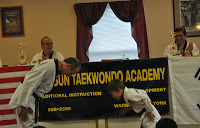 What is Tradition? Though there are many definitions of the term, one is "an inherited, established, or customary pattern of thought, action, or behavior."1 This definition seems a particularly apt description of Chosun's philosophy and pedagogy, for several reasons.One reason is the mention of inheritance. In this regard, Chosun students are lucky enough to be part of a direct connection to those that established taekwondo in the United States, and continue not only to actively practice the art, but carefully pass along the discipline and techniques in a way that makes obvious the esteem with which they are held. Another reason it seems apt is that our classes are routinely peppered with lectures and demonstrations of the established patterns of taekwondo thought, action AND behavior. Nearly every class provides some intriguing glimpse of deeper topics, such as the role of the I Ching, Ki development, or taekwondo as an "action philosophy." The students regular exposure to these diverse areas makes it clear that the formal exercises and techniques comprise only a portion of the broader tradition that surrounds the martial art.
What is Tradition? Though there are many definitions of the term, one is "an inherited, established, or customary pattern of thought, action, or behavior."1 This definition seems a particularly apt description of Chosun's philosophy and pedagogy, for several reasons.One reason is the mention of inheritance. In this regard, Chosun students are lucky enough to be part of a direct connection to those that established taekwondo in the United States, and continue not only to actively practice the art, but carefully pass along the discipline and techniques in a way that makes obvious the esteem with which they are held. Another reason it seems apt is that our classes are routinely peppered with lectures and demonstrations of the established patterns of taekwondo thought, action AND behavior. Nearly every class provides some intriguing glimpse of deeper topics, such as the role of the I Ching, Ki development, or taekwondo as an "action philosophy." The students regular exposure to these diverse areas makes it clear that the formal exercises and techniques comprise only a portion of the broader tradition that surrounds the martial art.
Further, the definition implies that established customs may be used as measures of correctness both for students who seek to acquire skills, as well as the quality and methods of instruction. It seems apparent to me as a Chosun student that I'm the beneficiary of carefully tended standards for proper skill execution and the master/student relationship that goes back to the founding of taekwondo and into earlier times as well.
To me, this sense of the historical connection powerful, and unique. There is a sense of belonging with others that have come before and currently practice. Maybe it's just my advancing age, but the instruction at Chosun has made a sense of fraternity with taekwondo students (and perhaps other martial arts styles, as well) almost palpable.Due to this sense of fraternity, there is also a feeling that there is a responsibility to protect the integrity of the practice. As a Chosun student, I can sense the desire of all instructors to preserve the art. For example, several of the black belt poomsae I've seen practiced are somewhat rare, their teaching often limited as schools sometimes feel the need to simplify their curriculum. And the commitment to return to Korea regularly to connect directly with the Moo Duk Kwon ensures that traditions are transmitted directly to the student body. One previous training experience I had highlights to me the difference between this traditional training approach and a more, er, eclectic approach. For a short time I trained at a school in Philadelphia (where I had gone to university). The school billed itself as a taekwondo studio, but the actual classes included a hodge-podge of taekwondo, grappling, aikido, and probably other styles. Further, while taught by a black belt instructor, there was no indication that this instructor was a master of these various styles. As a result, I had no confidence that the skills I was being taught were vetted and battle-tested, as are those we practice at Chosun. By following a traditional training regime, we can be confident that we study carefully-selected techniques that have been tested, refined, and transmitted with the utmost integrity.
1 http://www.merriam-webster.com/dictio...
______________________________
Mark Rodenburg
February 1, 2012
 What is Tradition? Though there are many definitions of the term, one is "an inherited, established, or customary pattern of thought, action, or behavior."1 This definition seems a particularly apt description of Chosun's philosophy and pedagogy, for several reasons.One reason is the mention of inheritance. In this regard, Chosun students are lucky enough to be part of a direct connection to those that established taekwondo in the United States, and continue not only to actively practice the art, but carefully pass along the discipline and techniques in a way that makes obvious the esteem with which they are held. Another reason it seems apt is that our classes are routinely peppered with lectures and demonstrations of the established patterns of taekwondo thought, action AND behavior. Nearly every class provides some intriguing glimpse of deeper topics, such as the role of the I Ching, Ki development, or taekwondo as an "action philosophy." The students regular exposure to these diverse areas makes it clear that the formal exercises and techniques comprise only a portion of the broader tradition that surrounds the martial art.
What is Tradition? Though there are many definitions of the term, one is "an inherited, established, or customary pattern of thought, action, or behavior."1 This definition seems a particularly apt description of Chosun's philosophy and pedagogy, for several reasons.One reason is the mention of inheritance. In this regard, Chosun students are lucky enough to be part of a direct connection to those that established taekwondo in the United States, and continue not only to actively practice the art, but carefully pass along the discipline and techniques in a way that makes obvious the esteem with which they are held. Another reason it seems apt is that our classes are routinely peppered with lectures and demonstrations of the established patterns of taekwondo thought, action AND behavior. Nearly every class provides some intriguing glimpse of deeper topics, such as the role of the I Ching, Ki development, or taekwondo as an "action philosophy." The students regular exposure to these diverse areas makes it clear that the formal exercises and techniques comprise only a portion of the broader tradition that surrounds the martial art. Further, the definition implies that established customs may be used as measures of correctness both for students who seek to acquire skills, as well as the quality and methods of instruction. It seems apparent to me as a Chosun student that I'm the beneficiary of carefully tended standards for proper skill execution and the master/student relationship that goes back to the founding of taekwondo and into earlier times as well.
To me, this sense of the historical connection powerful, and unique. There is a sense of belonging with others that have come before and currently practice. Maybe it's just my advancing age, but the instruction at Chosun has made a sense of fraternity with taekwondo students (and perhaps other martial arts styles, as well) almost palpable.Due to this sense of fraternity, there is also a feeling that there is a responsibility to protect the integrity of the practice. As a Chosun student, I can sense the desire of all instructors to preserve the art. For example, several of the black belt poomsae I've seen practiced are somewhat rare, their teaching often limited as schools sometimes feel the need to simplify their curriculum. And the commitment to return to Korea regularly to connect directly with the Moo Duk Kwon ensures that traditions are transmitted directly to the student body. One previous training experience I had highlights to me the difference between this traditional training approach and a more, er, eclectic approach. For a short time I trained at a school in Philadelphia (where I had gone to university). The school billed itself as a taekwondo studio, but the actual classes included a hodge-podge of taekwondo, grappling, aikido, and probably other styles. Further, while taught by a black belt instructor, there was no indication that this instructor was a master of these various styles. As a result, I had no confidence that the skills I was being taught were vetted and battle-tested, as are those we practice at Chosun. By following a traditional training regime, we can be confident that we study carefully-selected techniques that have been tested, refined, and transmitted with the utmost integrity.
1 http://www.merriam-webster.com/dictio...
______________________________
Published on February 24, 2012 08:11
February 3, 2012
Warwick Local Notable: Doug Cook
Chronogram Magazine
Community Pages
Warwick, NY February, 2012
by Gregory Shoenfield
That there are so many routes to Warwick's soul is one of its most appealing charms, and Main Street would not be the same without Taekwondo Master Doug Cook's way of the noble warrior.
The sixth-degree blackbelt and his family came to Warwick from New York City in 1985. Like so many others, he was drawn by the energy of a community that he is now an integral part of creating. "I came here many times with my parents as a kid," says Cook, "and I knew this was where I wanted to raise my own children." Cook's Chosun Academy has now been in its same Main Street location for 15 years, where he teaches Taekwondo and wife Patty offers hatha yoga classes.
Cook, a longtime teacher, published author, and columnist, is a committed advocate of the unique balance of the Warwick community, one that reflects his own discipline. "The people here are mindful, people who are rooted in the earth," Cook explains. "We are both artistically and agriculturally based, and the two juxtapose each other very nicely."
 Cook's own brand of community outreach is exemplified perfectly in Chosun's Leadership Team. A constantly replenished group of 25 teens and children—with no shortage of those wanting to join—provides a host of community services locally. Over the past seven years, the Leadership Team has raised thousands for local animal shelters, the Lions Club, and beyond. "It's an integral part of the nobility," says Cook. "They are creating their own reality by taking action. You'd be amazed at how effective they are." Sounds more like just another day at the dojo in Warwick.
Cook's own brand of community outreach is exemplified perfectly in Chosun's Leadership Team. A constantly replenished group of 25 teens and children—with no shortage of those wanting to join—provides a host of community services locally. Over the past seven years, the Leadership Team has raised thousands for local animal shelters, the Lions Club, and beyond. "It's an integral part of the nobility," says Cook. "They are creating their own reality by taking action. You'd be amazed at how effective they are." Sounds more like just another day at the dojo in Warwick. 
Community Pages
Warwick, NY February, 2012
by Gregory Shoenfield
That there are so many routes to Warwick's soul is one of its most appealing charms, and Main Street would not be the same without Taekwondo Master Doug Cook's way of the noble warrior.
The sixth-degree blackbelt and his family came to Warwick from New York City in 1985. Like so many others, he was drawn by the energy of a community that he is now an integral part of creating. "I came here many times with my parents as a kid," says Cook, "and I knew this was where I wanted to raise my own children." Cook's Chosun Academy has now been in its same Main Street location for 15 years, where he teaches Taekwondo and wife Patty offers hatha yoga classes.
Cook, a longtime teacher, published author, and columnist, is a committed advocate of the unique balance of the Warwick community, one that reflects his own discipline. "The people here are mindful, people who are rooted in the earth," Cook explains. "We are both artistically and agriculturally based, and the two juxtapose each other very nicely."
 Cook's own brand of community outreach is exemplified perfectly in Chosun's Leadership Team. A constantly replenished group of 25 teens and children—with no shortage of those wanting to join—provides a host of community services locally. Over the past seven years, the Leadership Team has raised thousands for local animal shelters, the Lions Club, and beyond. "It's an integral part of the nobility," says Cook. "They are creating their own reality by taking action. You'd be amazed at how effective they are." Sounds more like just another day at the dojo in Warwick.
Cook's own brand of community outreach is exemplified perfectly in Chosun's Leadership Team. A constantly replenished group of 25 teens and children—with no shortage of those wanting to join—provides a host of community services locally. Over the past seven years, the Leadership Team has raised thousands for local animal shelters, the Lions Club, and beyond. "It's an integral part of the nobility," says Cook. "They are creating their own reality by taking action. You'd be amazed at how effective they are." Sounds more like just another day at the dojo in Warwick.
Published on February 03, 2012 11:31
Totally Taekwondo Magazine Issue #35 January, 2012
Nobility in Motion
by Master Doug Cook
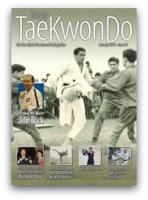
A particularly valid exercise when weighing the true value of martial arts training in modern times is an exploration of the balance between practicality and effort - or put another way, what is it that can ultimately be gained from the vast amount of time and sweat we invest in our daily practice? Most tae kwon doists will undoubtedly have little difficulty answering this question with responses ranging from defensive proficiency and physical fitness to personal entertainment and social interaction. But, for the most part these legitimate replies only scratch at the surface of what truly lies beyond the obvious benefits of traditional tae kwon do training.
Read entire article...
by Master Doug Cook

A particularly valid exercise when weighing the true value of martial arts training in modern times is an exploration of the balance between practicality and effort - or put another way, what is it that can ultimately be gained from the vast amount of time and sweat we invest in our daily practice? Most tae kwon doists will undoubtedly have little difficulty answering this question with responses ranging from defensive proficiency and physical fitness to personal entertainment and social interaction. But, for the most part these legitimate replies only scratch at the surface of what truly lies beyond the obvious benefits of traditional tae kwon do training.
Read entire article...
Published on February 03, 2012 09:13
Chosun e-newsletter archive Volumn 3 #2 February, 2012
Dojang News and Events
Bullying Workshop
Sunday February 19, 2012 12:00pm
 Chosun Taekwondo AcademyPresented by Gary J. Stevens, 6th Dan USTA Master Instructor, school owner and children's author of
Chosun Taekwondo AcademyPresented by Gary J. Stevens, 6th Dan USTA Master Instructor, school owner and children's author of
"If I Called You a Hippopotamus"
Don't miss this important workshop that addresses a very serious and growing problem affecting our young people.
Master Stevens will be offering autographed copies of his book for sale. Price: $11.50. Provide a check made payable to "Gary Stevens" .
Read entire newsletter....
Bullying Workshop
Sunday February 19, 2012 12:00pm
 Chosun Taekwondo AcademyPresented by Gary J. Stevens, 6th Dan USTA Master Instructor, school owner and children's author of
Chosun Taekwondo AcademyPresented by Gary J. Stevens, 6th Dan USTA Master Instructor, school owner and children's author of"If I Called You a Hippopotamus"
Don't miss this important workshop that addresses a very serious and growing problem affecting our young people.
Master Stevens will be offering autographed copies of his book for sale. Price: $11.50. Provide a check made payable to "Gary Stevens" .
Read entire newsletter....
Published on February 03, 2012 08:12
January 22, 2012
January 11, 2012
TaeKwonDo Times Magazine Traditions Column by Master Doug Cook January, 2012
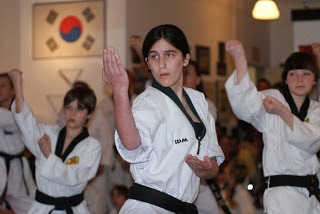 The Demon of Self-Doubt
The Demon of Self-DoubtRemember your first tae kwon do class? I will never forget mine and I am confident most of our readers will not forget theirs either. The experience was like meeting a new love for the first time. I felt an instant connection to the art and as the years went by, a blossoming of passion that remains with me to this day. And just like a successful marriage, that early infatuation has matured into an enduring bond. Yet I do not feel unique. Many of you certainly share similar emotions. So, how do we explain the actions of those who initially concur with this line of reasoning yet impulsively terminate their training at some point for no apparent reason?
Anyone who engages in a serious study of traditional tae kwon do can tell you it is a difficult pursuit. There is no elevator to success; you must laboriously scale each step to the top. Every class represents a challenge of some sort coupled with the fact that the tae kwon doist cannot help but experience peaks and valleys in the course of their practice. Tae kwon do mirrors life and, just as in daily life, things are not always perfect. Certainly, there are times when you will enjoy an exemplary training session, one where every stance flows smoothly, where every kick is well placed and strikes exhibit unstoppable power. However, if that were consistently the case, everyone would be a master. Instead, it is more likely that days will be endured when techniques refuse to come easy, when you seem to be digressing rather than advancing. It is times such as these when the true spirit of tae kwon do must materialize allowing indomitable will to trump faltering action.
Read the entire column...
Published on January 11, 2012 14:22
January 10, 2012
Paying Tribute to a Legend: Honoring Grandmaster Richard Chun by Master Doug Cook
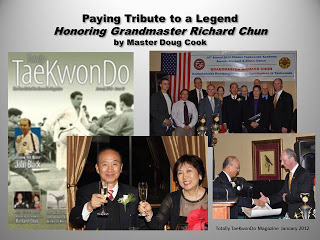 Tae Kwon Do, the traditional martial art and Olympic sport of Korea, is an inheritance; an art handed down from venerable master to worthy disciple over the decades. Since its official inception in 1955, evolving from a disparate collection of fighting styles to the most popular martial art in the world today, the discipline has grown, overflowing the borders of its native land. Through an ingenious process of standardization introduced during its formative years by the Korea Taekwondo Association, Tae Kwon Do has today become unified and transferable wherever it is taught, flooding the globe with the physical and philosophical principles it resolutely promotes.
Tae Kwon Do, the traditional martial art and Olympic sport of Korea, is an inheritance; an art handed down from venerable master to worthy disciple over the decades. Since its official inception in 1955, evolving from a disparate collection of fighting styles to the most popular martial art in the world today, the discipline has grown, overflowing the borders of its native land. Through an ingenious process of standardization introduced during its formative years by the Korea Taekwondo Association, Tae Kwon Do has today become unified and transferable wherever it is taught, flooding the globe with the physical and philosophical principles it resolutely promotes. Yet, as students of Tae Kwon Do in America, we are largely indebted to five great masters who, in the 1960s, emigrated from Korea to the shores of this great nation with the distinct purpose of transmitting the heritage of the art on to others deserving of its virtues. Among these vanguards were Ki Whang Kim, Son Duk Sung, Sijak Henry Cho, Jhoon Rhee and Rhin Moon Richard Chun. Two are no longer with us while three of the original five continue to vigorously represent Tae Kwon Do today.
Sadly, not every Tae Kwon Doist was given the prospect of training under one of these remarkable men. Yet, as providence would have it, we of the United States Taekwondo Association and, subsequently, the Chosun Taekwondo Academy, have been afforded that singular opportunity through our close association with one of the original five – Grandmaster Richard Chun.
Read entire article... (Totally TaeKwonDo Magazine issue 35 page 7)
Published on January 10, 2012 14:21



